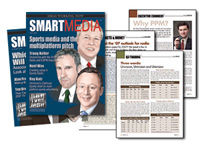|
|
|
|
|
Volume 24, Issue 151, Jim Carnegie, Editor & Publisher
|
Friday Morning August 3rd, 2007
|
|
|
Radio News ®
|
 Arbitron defends Arbitron defends
PPM training for agencies
Responding to the blistering attack from Cox Radio CEO Bob Neil (8/2/07 RBR #150), Arbitron notes that is has provided training on Portable People Meter (PPM) ratings to hundreds and hundreds of agency buyers, planners and managers. By the numbers, Arbitron says it conducted about 200 training session in 2006 (stations and agencies combined), about 240 station training sessions and nearly 200 agency training sessions in the first six months of 2007, with most in Houston and Philadelphia, the first two markets to go live with PPM. Thus far, some 234 planner buyers, 284 media planners, 701 media buyers and 451 agency managers have attended Arbitron PPM training sessions. "All those facts aside: Training the agencies does not preclude them from testing radio to see if they can get lower prices. How radio responds to this pressure will be important to the outcome," said Arbitron Sr. VP of Press and Investor Relations Thom Mocarsky.
RBR observation: This disagreement is no doubt going to drag on for some time. After reading of Arbitron's training claims in yesterday afternoon's MBR, Neil emailed RBR his view that, "unfortunately if they produced these numbers the same way they've been handling their sample sizes, it's probably about half of that and they weighted them up."
LA still drag on Radio One, but not for sale
Q2 revenues dropped 6% for Radio One, with its reformatted Los Angeles station, KRBV-FM, still responsible for the biggest chunk of that shortfall. Some analysts have not been shy about suggesting that Radio One should sell the station, rather than try to operate a standalone in LA, but CEO Al Liggins was having none of it. "Los Angeles is the best radio market in the country," he said. Liggins concedes that there are too many Urban station in LA and "somebody's gotta go away," but it's not going to be him who flips out of the format. And, he notes, "selling that radio station has not entered the conversation." Rather, he says, the answer eventually may be getting bigger in LA. Radio One has recently sold stations in Boston, Minneapolis, Dayton and Louisville. "I think the big asset sales are done," CEO Al Liggins said of the company's portfolio realignment, although its Boston AM is still for sale. As for business conditions, "Q3 is looking modestly better than Q2 and we're hoping it will end better than Q2."
|
|
|
Groups adjusting to PPM
Since both Beasley and Radio One have stations in Philadelphia, and Radio One in Houston as well, management at both companies were quizzed about PPM's impact in their Wall Street conference calls. Both Beasley President Bruce Beasley and Radio One CEO Al Liggins indicated that they are adjusting to the new electronic ratings and both said that Arbitron still has work to do to get the product right. Liggins said PPM is not having much of a sales impact in Houston, where he has little competition in the Urban formats. But that marketplace is more competitive in Philadelphia, where Radio One is up against Clear Channel, and meanwhile Liggins questions the real value of the ratings Jerry Lee's WBEB-FM, which he described as a "soft elevator music AC," is getting in young demos. Their PPM may be picking up the station's encoded signal just because they are walking by a place where it is playing, but Liggins questions whether the ads make any connection with those young people.
 Radio rates up, Radio rates up,
listenership down
The FCC's own Senior Economist George Williams wrote "Review of the Radio Industry, 2007," one of the 10 studies just released as part of the ongoing media ownership review. Among the more provocative findings of his report is that while listenership declines, rates have approximately doubled. Williams cites Arbitron stats to detail a drop from 19.7M listerers per average quarter hour in 1998 to 18.4M in 2006, a 6.6% drop. Noting that the lower number of owners (he counts 5,133 in 1996 and only 3,121 in 2007, a 39% decline) deprives advertisers of bargaining chips over rates, he says "consolidation in the radio industry may allow radio companies to exercise market power in local markets and possibly nationally." He goes on, saying, "Overall, it appears that the cost of radio advertising has nearly doubled since the 1996 Act was passed." Looking at in-market competition, Williams gave average revenue shares of the top four radio clusters. In the top 50 zone, the #1 cluster averages a 34% piece of the revenue pie, with #2 getting 24% and #3 and #4 splitting the next 26% between them. The #1 firm is much more dominant in the 100 smallest markets, taking over half the pie with 54%, while #2 snags 30% and #3 and #4 share the next 13%. In 189 out of 299 Arbitron markets, the top firm earns at least 40% of the market's radio revenue, and in 111, the top two split at least 80%.
RBR observation: If you're wondering why the doubled rates don't seem to be showing up on your bottom line, join the club. Radio revenue in 1995 was 11.47B. In 2006, it was 20.14B. That's not close to double, before you even take into account that there is much more inventory to divide into the total collected so as to determine the average charge for a spot.
|
|
|
FCC looks into SDBs
Minority Media & Telecommunications Council has asked that the FCC restart its proceeding on media ownership rules since it felt its suggestions on increasing the participation of socially and economically disadvantaged businesses were given short shrift in the FCC's call for comments. The FCC will not go that far, but has agreed to open a second NPRM requesting comment on SDBs. The FCC says it already "...sought comment on MMTC's various proposals, as well as on the general issue of fostering minority and female ownership. We urged commenters to explain the effects, if any, that their rule proposals would have on ownership of broadcast outlets by minorities, women and small businesses." A critical aspect of this proceeding will be the definition of an SDB. MMTC notes that "the Prometheus opinion recognizes the importance of establishing a definition for SDBs because, in approving the small business cluster transfer policy, the court indicated that, by the next quadrennial review, the Commission would have the benefit of a stable definition of SDBs as well as implementation experience in order to reevaluate whether an SDB-based waiver policy would better promote the Commission's diversity objectives." The FCC has noted in turn that this definition may face constitutional challenge if it is tied to either race or gender. The FCC also seeks comment on the extent of its statutory to address such ownership issues. MMTC proposals have been attached in an appendix to the FCC's Second Further NPRM on this topic, available at fcc.gov.
RBR observation: One thing the FCC can't do but Congress can is reinstate the minority tax credit program. Just about everybody we've ever heard mention it is for it. Hey, Congress, get on the stick and put this back on the books.
 FCC reaffirms New Vision's Youngstown Parkin lot FCC reaffirms New Vision's Youngstown Parkin lot
The sale of WYTV-TV Youngstown OH from Chelsey Broadcasting to Parkin Broadcasting stipulated right up front and out in the open that the station would subsequently go into a shared services agreement (SSA) with New Vision-owned WKBN-TV. That arrangement would actually combine three networks together. WYTV carries ABC and, on a digital side channel, MNT. WKBN is the local CBS affiliate. The National Association of Broadcast Employees and Technicians-Communications Workers of America objected to the deal for three main reasons. (1) The deal was said to have been orchestrated by New Vision without a normal "bidding war" for the station; (2) it will knock off an independent news voice; and (3) the combination will result in job loss for its members. The stations responded that "nothing in NABET's petition supports any conclusion that the contemplated arrangements are not in compliance with the Commission's rules and policies." The FCC agreed and upheld the SSA. New Vision will not provide more than 15% of WYTV's programming, but the FCC can't say which 15% it may provide. And Parkin will receive 100% of WYTV's income, reimbursing New Vision for expenses incurred along with a management fee.
RBR observation: The rules are the rules. The FCC may or may not deplore the fact that New Vision produces news for WYTV, but whether it does or not, there simply is nothing it can do about that legally. As long as Parkin and New Vision remain at arms length, it would appear that NABET does not have a leg to stand on under the current regulatory framework.
|
|
|
|
| Wall Street Media Business Report TM |
Beasley beats its guidance
Q2 turned out a bit better than Beasley Broadcast Group had expected, with revenues up 8.2% to 34.8 million, or 1% on a same station basis. Interactive revenues are still a small part of the pie, but rose 126% from a year ago to over one million bucks, about 3.1% of total revenues. In his press statement, CEO George Beasley said the company is on tract to derive 5% of its revenues from interactive during the next 12 months. Station operating income for Q2 gained 4.1% to 10.4 million, but was down 2.3% on a same station basis. Looking forward, Beasley is expecting Q3 same station revenues to be down 3%.
Fisher revenues up, earnings flat
TV revenues were up 4% in Q2, but radio was down 5%, giving Fisher Communications a revenue gain overall of 3% to 41.3 million. On the bottom line, net income was flat with a year ago at 2.3 million.
 Entravision hurt Entravision hurt
by tough TV comps
TV lagged due to tough comps in Q2 at Entravision, while radio was up, so companywide revenues were down 4% to 76 million. "We continue to execute on our business plan and capitalize on the growth of the Hispanic media market. In the second quarter of 2007 we faced difficult World Cup and political comparisons from the prior year period, but we continued to drive both audience and advertising shares," said CEO Walter Ulloa. Pro forma radio revenues, adjusted for the sale of stations in Tucson and Dallas, were up 9% to 26.2 million. TV revenues declined 7% to 40.3 million and outdoor revenues were off 2% to 9.5 million. So, pro forma revenues were down 1%. But expenses rose 5%, so consolidated adjusted EBITDA declined 10% to 27 million.
Radio One pacing down after down quarter
Radio One's stock was down yesterday after it reported Q2 revenues down 6% to 86.1 million, with about half of that shortfall attributed to its Los Angeles station. Station operating income plunged 67% to 9.8 million. CEO Al Liggins noted that, except for in LA, Radio One slightly outperformed its markets in another tough quarter for the entire radio industry. He cited Radio One's Atlanta, Cincinnati and Dallas markets as being particularly strong in the quarter. CFO Scott Royster told analysts that excluding LA Q3 pacings are down in the low single digits and the company is forecasting that it will finish the quarter better than that. Including LA, the quarter is pacing down in the mid single digits.
|
|
|
|
|
Ad Business Report TM
|
 Multi-platform sports marketing Multi-platform sports marketing
By Ray Katz, U.S. Director of Sports Marketing,
Optimum Sports/OMD
Much has been written recently regarding the increasing challenges marketers face in trying to reach today's time-pressed, mobile, and multi-tasking consumers. These consumers are consuming more media than ever. In the world of sports marketing, the number of sports available through media platforms, the mediums used for consumption, and the convergence between sports media and sports properties are ever increasing. Sports marketing, across all categories and brands, has seen a proliferation of media mix, strategies, and tactics which are more divergent than ever. The purpose of this article on multi-platform sports marketing is to elaborate on four major themes;
1- Why an increasing percentage of marketing budgets are allocated towards sports
2- Changes in the sports business landscape in a "four screen world"
3- How marketers should best approach multi-platform sports marketing
4- How sports marketers are progressing with respect to measuring Return on Investment
| Read More... |
MasterCard partners with Placido Domingo
for "Around the World" tour
MasterCard Worldwide announced a partnership with world renowned Maestro, Placido Domingo, where the company will serve as the presenting sponsor of his "Around the World" tour. The tenor will perform numerous concerts around the globe, starting this summer and culminating in 2009. Concerts in Lisbon, Wiesbaden and Athens have already been held with the next concerts scheduled for Boston, Ft. Lauderdale, Abu Dhabi, United Arab Emirates; and Zurich, Switzerland. MasterCard, as a presenting sponsor, will receive benefits including hospitality, advertising and the opportunity to deliver "Priceless" experiences. MasterCard cardholders will receive discounts on purchased tickets and will have the opportunity to buy tickets during a pre-sale for selected shows. This announcement further enhances and supports MasterCard's affluent product platforms that include the James Beard House Celebrity Chef Tour and the PGA Tour.
|
|
|
|
| Media Business Report TM |
Youth exposure to alcohol ads in magazines declining
Youth exposure to alcohol advertising in magazines declined 49% from 2001 to 2005, according to a new report by the Center on Alcohol Marketing and Youth (CAMY) at Georgetown University. The study also found, however, that a substantial portion of the alcohol industry's ads remains in magazines with disproportionate youth (12-20 year-old) audience composition: 44% of advertisements and 50% of spending in 2005. Magazines with disproportionate youth audience composition were defined as those with youth audiences greater than 15%, the proportion of youth ages 12-20 in the general population age 12 and above. Most alcohol companies have successfully shifted their advertising to publications that meet the voluntary maximum of 30% youth audience composition adopted by the beer and distilled spirits trade associations in 2003. According to the report, less than 1% of alcohol advertisements and alcohol advertising dollars in 2005 were in magazines with youth readership exceeding the industry standard, down from a high of 11% in 2002.
|
|
|
|
| Media Markets & Money TM |
 Maryland noncom goes coastal Maryland noncom goes coastal
Your Public Radio Corporation, a non-profit station group operating in portions of Maryland, is adding a key portion, the popular resort portion of the state along the Atlantic shore. The group has a deal in the works to acquire WRSX-FM Ocean City. According to broker John Pierce, YPRC will pay Spectrum Media LLC 1.075M for the 106.9 MHz station. The buyer is headed by Anthony Brandon, who has extensive experience running commercial radio stations, often under the umbrella of American General Media. YPRC already operates two 88.1 MHz facilities, WRPR-FM in Baltimore and WYPF-FM in Frederick.
Close encounter in South Dakota
College Creek Media has completed its sale of a DIY FM stick to James River Broadcasting, owned in turn by the Robert Ingstad Family, according to Media Services Group broker Jody McCoy, who handled the transaction. The Class C1 on 100.3 MHz fetched 450K. Presho is located in the south central portion of the state along the I-90 corridor, far removed from Arbitron-rated territory.
|
|
|
|
| Washington Media Business Report TM |
House panel moves shield forward
32 states and the District of Columbia have laws on the books which protect the right of a reporter to in turn protect the identity of a confidential source. If the full House, the Senate and President Bush go along with the House Judiciary Committee, so will the United States. The Free Flow of Information Act of 2007 passed on voice vote with bipartisan support led by Rick Boucher (D-VA), John Conyers (D-MI), Mike Pence (R-IN), Howard Coble (R-NC), Greg Walden (R-OR) and John Yarmuth (D-KY) in the House. A similar bill is being shepherded through the Senate by Richard Lugar (R-IN), Christopher Dodd (D-CT), Lindsey Graham (R-SC), Mary Landrieu (D-LA) and Pete Domenici (R-NM). NAB's Dennis Wharton commented, "Broadcasters take great pride in providing listeners and viewers with critical information that at times carries significant risk to both reporters and their sources. We look forward to quick action from the full House and with companion legislation in the Senate."
RBR observation: The Senate may indeed second the House on this one, but the bill is likely to run into opposition from the Department of Justice and the White House. Without a signature from the Executive Mansion, the shield may be waiting around until there is a new occupant in 2009. However, legislators have continued to push for this over the past few years, and we expect they will keep on pushing until all of the necessary approval points align in its favor.
|
|
|
|
| Internet Media Business Report TM |
 Social networking goes global Social networking goes global
comScore released the results of a study on the expansion of social networking across the globe, revealing that several major social networking sites have experienced dramatic growth during the past year. Social networking behemoth MySpace.com attracted more than 114 million global visitors age 15 and older in June, representing a 72% increase versus year ago. Facebook.com experienced even stronger growth during that same time frame, jumping 270% to 52.2 million visitors. Bebo.com (up 172% to 18.2 million visitors) and Tagged.com (up 774% to 13.2 million visitors) also increased by orders of magnitude. While attracting global users, specific social networks have a tendency to skew in popularity in different regions. For example, both MySpace.com (62%) and Facebook.com (68%) attract approximately two-thirds of their respective audiences from North America. That said, each has already amassed a large international visitor base and both appear poised to continue their global expansion. Bebo.com has a particularly strong grasp on Europe, attracting nearly 63% of its visitors from that region, while Orkut is firmly entrenched in Latin America (49%) and Asia-Pacific (43%). Friendster also attracts a significant proportion of its visitors (89%) from the Asia-Pacific region. Both Hi5.com and Tagged.com exhibit more balance in their respective visitor bases, drawing at least 8% from each of the five worldwide regions.
|
|
|
|
| Ratings & Research |
More Canadians choosing Internet over TV, radio
An increasing number of Canadians are subscribing to high-speed Internet and companies are doubling their advertising efforts on new media platforms. Meanwhile, Canadians are watching less TV and listening to fewer hours of radio programming, yet operators in the sectors are squeezing more sales, reports The Financial Post on the annual broadcasting industry report prepared by the Canadian Radio-television and Telecommunications Commission (CRTC). The study found that in 2006, the number of Canadians who either listened to radio or watched TV over the Internet increased slightly. Moreover, Canadian households with Internet access climbed, to 70% from 64%, with a bigger increase in households signing on to high-speed subscribers, to 60% from 51%. "Advertisers have noticed, and have almost doubled their spending on online marketing, to 1 billion last year from 562 million in the year-ago period," said the article. "As for the conventional sectors, Canadians watched on average 27.6 hours of TV per week in 2006, slightly under the 28.1 hours in 2005. Revenue for TV operators increased almost 8%. For radio, Canadians listened to 18.6 hours per week in 2006, a little less than the 19.1 in 2005. Sales for that medium increased 5.7%."
|
|
|
|
| Transactions |
22.5M KZBD-FM/KURB-AM/KDRK-FM/KGA-AM/KBBD-FM, KEYF-AM & KEYF-FM Spokane WA (Spokane, Dishman, Cheney WA) from Citadel Broadcasting Company (Farid Suleman) to Mapleton Communications LLC (Adam Nathanson). 1M escrow, balance in cash at closing. Includes non-compete other than for affiliates of Citadel's ABC Radio Networks. Citadel may receive up to 1.5M extra if buyer's KPIG-AM Piedmont CA (San Francisco) is able to upgrade nighttime power, at one dollar apiece for persons above 225K added to stations nighttime coverage area. Existing superduopoly. [File date 7/10/07.]
250K KUKA-FM San Diego TX from Ideal Media Inc. (Armando Marrquin Jr.) to Claro Communications LLP (Gerald Benavides). 25K escrow, balance in cash at closing. [File date 7/10/07.]
|
|
|
|
| Stock Talk |
Market up, radio down
The stock market rebounded again on Thursday, but not the radio sector, with traders cheered by a government report that unemployment claims were lower than expected. The Dow Industrials rose 101 points, or 0.7%, to 13,463.
Radio stocks did not participate in the rally. The Radio Index declined 0.940, or 0.7%, to 135.789, its sixth straight year-to-date low. Radio One was punished heavily for its Q2 results and forward guidance. Its Class D stock fell 7.1% and Class A 6.7%. cox Radio declined 2.9% and Emmis 2.8%.
|
|
|
|
| Radio Stocks |
Here's how stocks fared on Thursday
| Company |
Symbol |
Close |
Change |
Company |
Symbol |
Close |
Change |
|
Arbitron
|
ARB
|
|
51.91
|
+0.61
|
Google
|
GOOG
|
|
511.01
|
-1.93
|
|
Beasley
|
BBGI
|
|
8.65
|
+0.06
|
Hearst-Argyle
|
HTV
|
|
20.57
|
-0.07
|
| CBS CI. B |
CBS |
 |
32.53
|
+0.56
|
Journal Comm.
|
JRN
|
 |
10.56
|
-0.07
|
| CBS CI. A |
CBSa |
 |
32.56
|
+0.57
|
Lincoln Natl.
|
LNC
|
 |
60.76
|
+0.76
|
| Citadel |
CDL |
|
4.83 |
+0.02 |
Radio One, Cl. A
|
ROIA
|
|
5.42
|
-0.39
|
|
Clear Channel
|
CCU
|
|
36.88
|
+0.01
|
Radio One, Cl. D
|
ROIAK
|
|
5.40
|
-0.41
|
|
Cox Radio
|
CXR
|
|
12.96
|
-0.39
|
Regent
|
RGCI
|
|
3.36
|
-0.04
|
|
Cumulus
|
CMLS
|
|
10.46
|
-0.01
|
Saga Commun.
|
SGA
|
|
7.15
|
-0.13
|
|
Debut Bcg.
|
DBTB
|
|
1.70
|
-0.10
|
Salem Comm.
|
SALM
|
|
8.41
|
+0.39
|
|
Disney
|
DIS
|
|
34.36
|
+0.53
|
Sirius Sat. Radio
|
SIRI
|
|
2.99
|
+0.01
|
|
Emmis
|
EMMS
|
|
6.95
|
-0.20
|
Spanish Bcg.
|
SBSA
|
|
3.21
|
-0.04
|
|
Entercom
|
ETM
|
|
20.97
|
-0.11
|
SWMX
|
SMWX
|
|
0.10
|
-0.05
|
|
Entravision
|
EVC
|
 |
9.15
|
-0.12
|
Westwood One
|
WON
|
 |
5.21
|
unch
|
|
Fisher
|
FSCI
|
|
46.63
|
+0.25
|
XM Sat. Radio
|
XMSR
|
|
11.51
|
+0.06
|
|
|
|
|
|
|
Bounceback
|
 We want to We want to
hear from you.
This is your column, so send your comments and
a photo to [email protected]
|
|
|
Below the Fold
|
|
Ad Business Report
Multi-platform sports marketing
Ray Katz at Optimum Sports/OMD elaborates on four major themes...
Media Business Report
Youth exposure to alcohol ads
In magazines declining as most alcohol companies have successfully shifted their advertising to publications that meet...
Media Markets & Money
Maryland noncom goes coastal
Group has a deal in the works to acquire WRSX-FM Ocean City...
Ratings & Research
Canadians choosing
Internet over TV, radio...
|
|

|
Stations for Sale
|
Colorado
FM CP, Class C3
Transmitter, Antenna,
Tower Lease included
Gordon Rice Associates
(843) 884-3590 or
E-mail Gordon Rice Here
New Hampshire
AM/FM combo
First Class facilities in NH's
fastest growing area. Double
digit increases last 6 years.
Priced at 10x trailing BCF $4.99MM
Inquiries 781-848-4201 or
E-mail: [email protected]
WEB: radiostationsforsale.net
MCH Enterprises, Inc.
CA Coast FM: $1.5M
NV Boomtown: $895K
www.mchentinc.com
805.680.2265 (cell)
 Market your Stations For Sale Market your Stations For Sale
in our daily epapers.
Contact
June Barnes
[email protected]
|
|
|
Radio Media Moves
|
 New OM in Nashville New OM in Nashville
Rich Davis has been named Operations Manager for the Clear Channel Radio cluster in Nashville, including five stations and the Tennessee Radio Network. He had been Program director for one of those stations, WRVW-FM.
 Lee to Big D Lee to Big D
ESPN O&O KESN-FM Dallas-Ft Worth has hired Tom Lee as its Program Director. He will also oversee the launch of ESPN Deportes station, KNIT-AM, as Program Director. Lee was previously PD of CBS Radio's WIP-AM Philadelphia. In Dallas, Lee succeeds John Lund, who has moved on to Salt Lake City as an Assistant PD and morning drive host on KZNS-AM.
|
|
|
More News Headlines
|
Entercom countersues
To no one's surprise, Entercom has countersued to keep talk host Howie Carr from leaving WRKO-AM Boston for Greater Media's WTKK-FM. The Boston Herald reports that the lawsuit against Carr and his agent was filed Wednesday, claiming that they conspired to break his contract with Entercom by negotiating with Greater Media. The dueling lawsuits come down to one main point - whether the provision in Carr's current contract giving Entercom 72 hours to match another offer is legal in Massachusetts. Entercom's lawyers say it is. Carr's lawyers say it isn't.
Air America adds new evening programming
"CLOUT! with Richard Greene", which has been airing twice on weekends, will be moving into a weeknight slot from 8-10p ET beginning 9/4. Greene is a Political Communication Strategist to Democratic senators, representatives and governors. The Bree Walker Show will be on the air weeknights from 10pm-midnight ET and will be a daily version of the progressive-leaning program she hosts now every Saturday on KTLK-AM LA. These new programs replace The Air Americans with Mark Riley.
|
|
|
SmartMedia Magazine
|

Coming in September
FALL NAB ISSUE
SPECIAL DISTRIBUTION:
NAB RADIO SHOW
Radio Roundtable:
Radio execs find solutions.
Media Markets and Money:
What's attractive to equity capital these days?
Ad Biz:
Gennele Niblack, Katz Political President
Sales:
Dial Global's Eileen Decker on radio ad sales
News/Talk:
Using your website to get, keep and grow your audiences
Political Advertising:
Greg Pinello, GMMB: Political dollars for radio: The need for there to be more ideological diversity in the news-talk format; Tom Edmonds, a Republican strategist with Edmonds and Associates
Legal Ease:
Gregg Skall:
"The FCC rules on political ads-Network exception issue".
HD Radio:
Monetizing Conditional Access
New Media:
Gary Arlen: YouTube, Joost and the emerging Fox-NBC website are just the start of big bandwidth video via the Internet.
Streaming:
The impact of CRB Royalty rates on webcasters and streaming ads.
For advertising
information, contact:
June Barnes
[email protected] 803-731-5951;
Jim Carnegie
[email protected] 813-909-2916 or
Carl Marcucci
[email protected] 703-492-8191.
|
|

|
RBR Radar 2007
|
|
Radio News you won't read any where else. RBR--First, Accurate, and Independently Owned.
|
The manure hits the fan
He may have signed a contract for Arbitron's Portable People Meter (PPM) as it rolls out to Cox Radio markets, but Cox CEO Bob Neil says he is going to be a difficult customer. He railed against Arbitron in his quarterly conference call, insisting that there are "massive problems" with the samples in both Houston and Philadelphia, the only two PPM markets currently up and running. As for the idea that advertising agencies were supposed to be educated by Arbitron to make a one-time adjustment to their CPM targets to switch from diaries from PPM, "that's a load of dog manure," Neil said. He charged that Arbitron has not lived up to its promises to educate agencies about PPM and he intends to keep the pressure on Arbitron to fix that and other problems.
08/02/07 RBR #150
Stations ally to oppose
performance tax
We thought there was very clear handwriting on the wall following this week's hearing on performance payments on broadcast, and we weren't the only ones. A new group has been formed in Washington comprised of "local radio broadcasters, Latino and African-American groups, non-profit associations and other community groups" to oppose attempts to levy a new "performance tax" in the form of artist/producer royalties for airplay. It's called the Free Radio Alliance.
RBR observation: If this is about large recording companies using musicians as pawns as they try to pick the pockets of broadcasters, then broadcasters are the ones occupying the moral high ground, no matter what anybody says to the contrary.
08/02/07 RBR #150
Copps wants Murdoch buy investigated by FCC
Since the Wall Street Journal is a national newspaper, it has been assumed that Rupert Murdoch's deal to buy Dow Jones & Company is a non-event as far as the FCC is concerned. Commissioner Michael Copps (D) begs to differ. "It's interesting to hear the "experts" claim the transaction faces no regulatory hurdles. Not so fast! This deal means more media consolidation and fewer independent voices, and it specifically impacts the local market in New York City. What's good for shareholders of huge media conglomerates isn't always what's good for the public interest or our civic dialogue..."
TVBR observation: Beg pardon Commissioner, but you are dead wrong on the law and regulations this time. Just as Gannett is not impacted by the crossownership rule from having the headquarters of USA Today in the Washington, DC market, where it has a TV station, there is no crossownership issue here for the New York market, where News Corporation owns two TV stations and the Wall Street Journal is headquartered. There is an ongoing issue with News Corporation also owning the New York Post under a crossownership waiver, but that is a completely separate matter.
08/02/07 TVBR #150
|
|
|
|
 |
Hard finding that key person
to fill the important position at your organization? Media HeadHunters is the place that key media firms use to get results. See Media HeadHunters and get results with service.
|
 |
|
|
|
|
Help Desk
|
__EMAIL__ :
Having problems with our epapers?
Please send Questions/Concerns to:
[email protected]
If you wish to remove your name completely from our database use this link __UNSUB__
RBR Epaper --  108 annual 108 annual
or just  9 a month 9 a month
|
|
|
|
©2007 Radio Business Report, Inc. All rights reserved.
Radio Business Report -- 2050 Old Bridge Road, Suite B-01, Lake Ridge, VA 22192 -- Phone: 703-492-8191
|
|